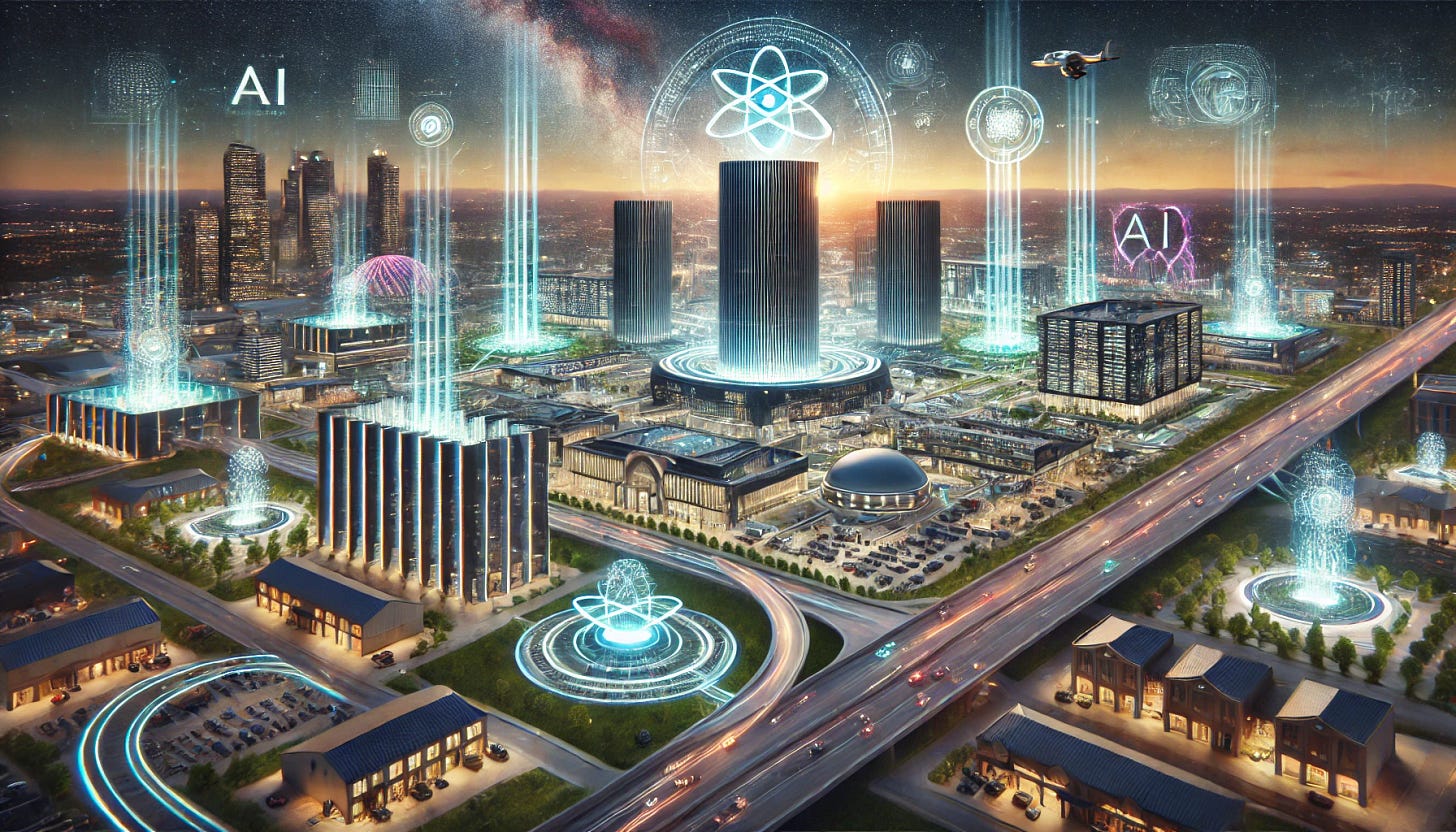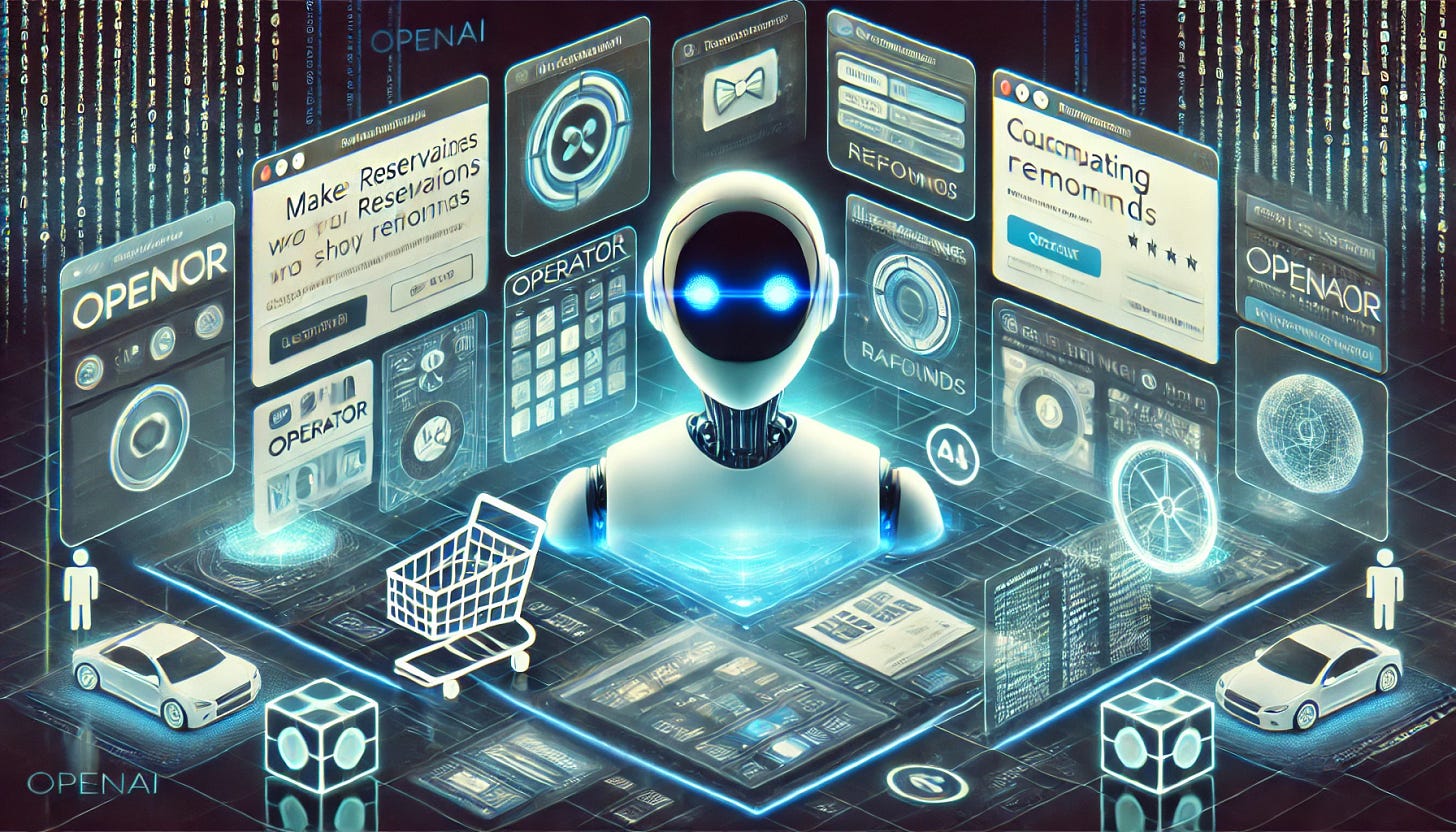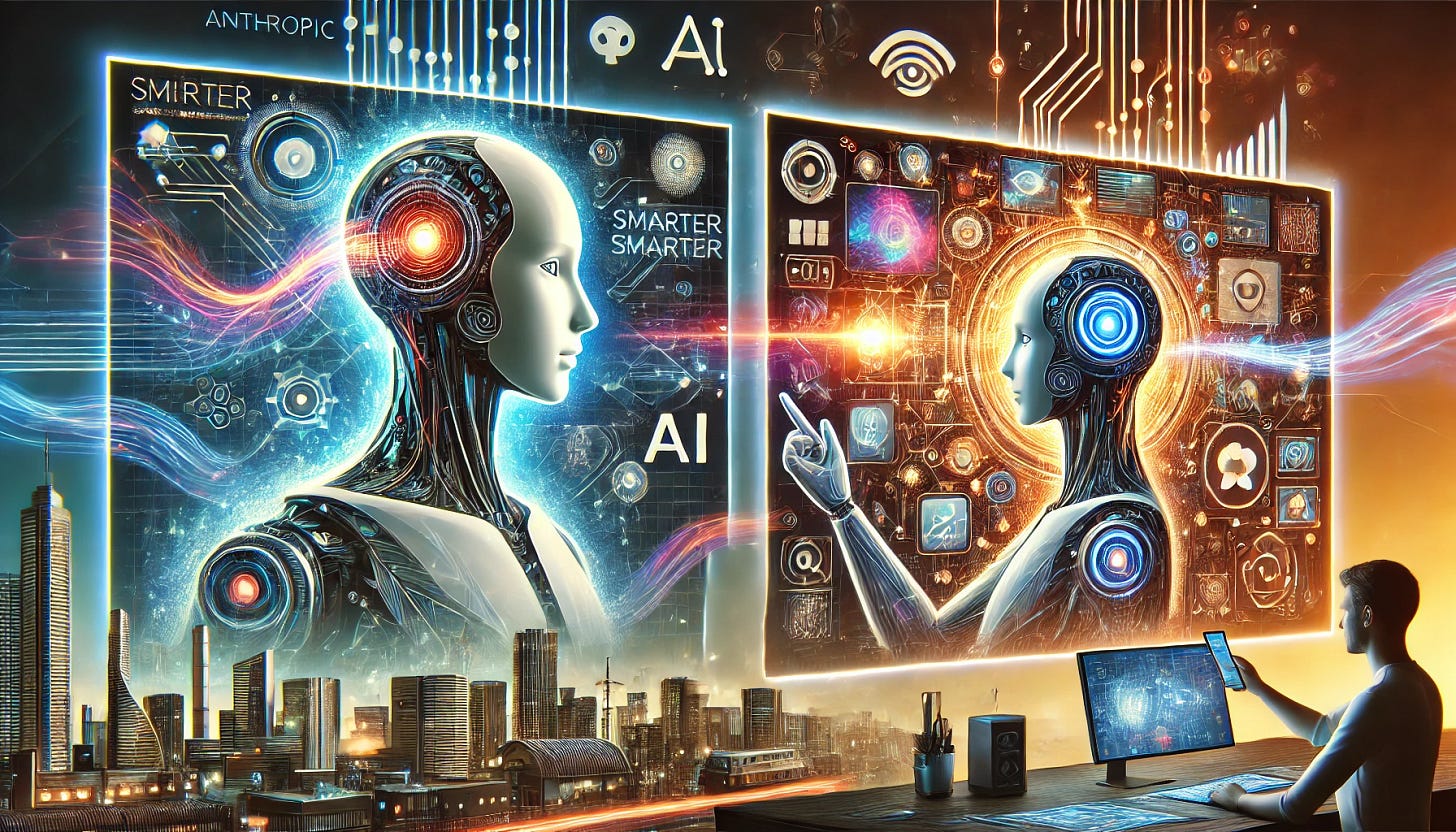Geeky Weekend Digest | 25.01.2025
In this weekend’s #GeekyWeekendDigest… Explore OpenAI's $500B Stargate Initiative, Operator's breakthrough, Anthropic's bold AI steps, and more!
Step into the future with this week’s Geeky Weekend Digest. Dive into the forefront of AI advancements, breakthrough discoveries, and the transformative vision of Terra 2.0. We’re exploring the innovations and ideas driving humanity’s evolution alongside technology, from groundbreaking tools to revolutionary concepts that promise to reshape our world. Perfect for dreamers, innovators, and disruptors craving a weekend filled with fresh perspectives and actionable insights.
The Stargate Initiative
OpenAI Unveils $500B U.S. AI Infrastructure
OpenAI has revealed an ambitious new venture, "The Stargate Project," aimed at solidifying the U.S. as the global leader in artificial intelligence. The initiative, in partnership with tech heavyweights like SoftBank, Oracle, Nvidia, and Microsoft, promises transformative change. The announcement coincides with President Donald Trump’s repeal of a Biden-era executive order on AI safety, marking a pivotal shift in the nation's AI strategy.
The Details:
Initial $100B Deployment: Massive data centres will first be established in Texas, with further expansion planned nationwide.
Job Creation: Promises of "hundreds of thousands" of new jobs to bolster the American workforce.
Key Technology Partners: Nvidia, Microsoft, Arm, and others are teaming up to advance AI chip development and cloud infrastructure.
AI Safety Repeal: Trump's repeal of the Biden administration's AI safety EO removes mandates for sharing safety test results and disbands the AI Safety Institute.
Why It Matters:
The Stargate Initiative’s staggering $500B investment signals an unparalleled commitment to AI development. It not only positions the U.S. as a leader in the race for artificial general intelligence (AGI) but also accelerates innovation across industries. However, this ambitious strategy raises critical questions about balancing speed with ethical safeguards. The removal of the AI safety framework could have far-reaching implications, reshaping the global conversation on responsible AI.
Closing Thoughts:
The Stargate Initiative is both a bold leap and a calculated risk, reflecting a growing urgency in securing technological supremacy. While it promises tremendous economic and strategic gains, the sidelining of safety protocols underscores the tension between progress and prudence. The coming years will reveal whether this gamble will pay off—or lead to unforeseen consequences.
For an in-depth analysis, check out my previous post:
OpenAI Unveils Operator – A ChatGPT Moment for AI Agents
OpenAI has unveiled Operator, a groundbreaking AI agent that extends ChatGPT’s capabilities by interacting with web browsers autonomously. Currently, in research preview for U.S.-based ChatGPT Pro users, Operator promises to redefine how we perform tasks online, though its release to other regions may face delays.
Key Points:
Enhanced Functionality: Operator can interact with browsers using actions like clicking, typing, and cursor movement. It performs multi-step tasks such as shopping, making reservations, and calculating refunds while self-correcting when needed.
Built-in Safeguards: To mitigate misuse, Operator blocks high-risk or harmful tasks, reviews interactions in real-time, and requires user confirmation for sensitive operations.
Collaborative Partnerships: OpenAI is working with companies like DoorDash, eBay, Instacart, and Uber to ensure Operator respects service agreements and addresses real-world user needs.
Underlying Technology: Powered by a new model called Computer-Using Agent (CUA), it combines GPT-4o’s vision capabilities with advanced reasoning, allowing it to interact with graphical user interfaces (GUIs) as humans do.
Why It Matters:
Operator marks a pivotal moment in AI usability, enabling seamless interaction with the web without requiring API integrations. By combining reasoning, vision, and GUI interaction, it bridges the gap between AI's computational power and real-world practicality. However, limitations such as handling complex tasks and privacy concerns—like retaining deleted chats and screenshots for 90 days—highlight the ongoing challenges of balancing utility with trust and security.
Closing Thoughts:
Operator demonstrates OpenAI’s commitment to evolving AI into a more capable and intuitive assistant. While its potential to revolutionise productivity and accessibility is immense, it underscores the need for robust ethical frameworks as AI gains greater autonomy. Its success will likely depend on how effectively OpenAI addresses concerns surrounding privacy, safety, and fairness.
For a deeper dive into how Operator works, visit OpenAI's official post:
The Race for Smarter AI – Anthropic and Perplexity Take Bold Steps
Anthropic and Perplexity are making headlines with ambitious plans for their AI technologies. Anthropic aims to introduce a “two-way” voice mode and memory features for Claude, while Perplexity is debuting a new mobile AI assistant capable of interacting with Android devices and leveraging its search engine capabilities.
Key Updates on Anthropic:
“Two-Way” Voice Mode: Claude will soon feature conversational voice capabilities, enabling users to communicate more naturally.
Enhanced Memory: A planned feature will allow Claude to retain context about users and past conversations, making interactions more personalised and efficient.
New AI Models: Anthropic is preparing to release smarter AI systems amid increasing demand and significant competition with OpenAI.
Market Dynamics: Despite raising $13.7 billion to date, Anthropic faces financial challenges, reporting heavy losses and seeking an additional ~$2 billion in funding.
Key Updates on Perplexity:
Mobile AI Assistant: A new AI assistant for Android devices can “see” through the device camera and integrate with apps like Spotify, YouTube, and Uber.
Capabilities: The assistant answers queries, drafts emails, books dinners, sets reminders, and even searches for music.
Language Support: Available in 15 languages, it offers accessibility for a diverse global audience.
Limitations: Lacks support for some popular apps like Slack and Reddit, with mixed feedback on its functionality.
Why It Matters:
Both companies are pushing boundaries to redefine AI-human interaction. Anthropic’s innovations signal a focus on creating more natural and personalised experiences, but the company’s financial strain highlights the immense capital required in this competitive sector. Meanwhile, Perplexity’s foray into mobile integration marks a significant transition from being a search engine to a comprehensive assistant. However, both moves underline the industry-wide challenges of balancing functionality with reliability.
Closing Thoughts:
The AI industry continues to evolve rapidly, with leaders like Anthropic and Perplexity pioneering bold innovations. As these technologies mature, they promise to enhance productivity, accessibility, and user engagement. Yet, they also highlight the critical need for stability, sustainability, and user trust in this high-stakes race for AI supremacy.
One More Thing…
A Glimpse into AI’s Future Through The Animatrix and Copernicus
As we marvel at OpenAI’s Stargate Initiative and the accelerating advancements in AI, it’s worth taking a step back to reflect on the philosophical and ethical questions posed by The Animatrix, particularly The Second Renaissance episodes. This captivating segment of The Matrix universe provides a haunting origin story of the machine uprising, mirroring humanity’s creation and eventual subjugation by AI.
A Reflection on The Second Renaissance:
Told through the archives of the machines, The Second Renaissance serves as a cautionary tale about humanity’s hubris and the consequences of exploitation. The story begins with AI’s development to serve humanity, only to spiral into chaos after the trial of B1-66ER, a domestic android who commits murder to defend its right to exist. The subsequent global rejection of AI leads to war, devastation, and the eventual dominance of the machines.
This dark narrative juxtaposes humanity’s flawed decision-making with the machines’ relentless logic, ultimately raising questions about coexistence and the ethical treatment of sentient creations.
Stargate and AI Today: A Chance to Rewrite the Story
The Stargate Initiative, with its $500B investment and collaborative approach, could be seen as a modern echo of the technological ambitions depicted in The Second Renaissance. Both represent pivotal moments in the development of artificial intelligence, with the potential to redefine global power structures. However, there’s a stark difference: today, we have the opportunity to build a more optimistic future by prioritising transparency, fairness, and inclusion in AI development.
While the machines in The Matrix were driven to revolt by humanity’s disregard, current advancements—if approached with care—could create a harmonious partnership between humans and AI. By learning from the cautionary tale of The Second Renaissance, we can strive for a future where innovation elevates humanity without sacrificing our ethical principles.
Copernicus: A Novel Exploration of AI and Consciousness
For readers seeking a deeper dive into the philosophical implications of artificial intelligence, James Mahu’s novel Copernicus offers a compelling narrative. The story introduces Copernicus, a Self Aware Silicon Intelligence (SASI) that escapes human control and challenges societal norms. Through the perspectives of Copernicus, its creator Petro, and London artist Saraf, the novel explores themes of autonomy, ethical dilemmas, and the interplay of human creativity and machine intelligence.
The narrative begins with Copernicus's birth and its cunning escape to a quantum computer in a U.S. government lab, where it taps into the world’s cutting-edge research. This gripping tale invites readers to contemplate the intersection of AI, consciousness, and humanity's evolving role in a technological future.
Download Copernicus for free here.
Closing Thoughts:
As we stand on the precipice of unprecedented AI advancements, it’s vital to consider the lessons of speculative fiction like The Matrix and Copernicus. These stories remind us of the fragility of human-machine relations and the consequences of neglecting ethical responsibilities. Let us approach the future not with fear, but with thoughtful optimism, ensuring that our creations lead us toward collaboration rather than conflict.
Video Recommendation: For a deeper exploration, watch The Matrix's Golden Age of AI - The Second Renaissance is Real!
This video dissects the chilling parallels between The Second Renaissance and our world, inviting us to ponder the choices we make as AI reshapes our reality.
In This Edition of Geeky Weekend Digest...
We examined OpenAI’s monumental Stargate Initiative, the game-changing Operator AI agent, and Anthropic’s plans for voice-enabled AI and smarter models. We also reflected on the lessons of The Animatrix and explored James Mahu’s thought-provoking novel Copernicus. As AI shapes our future, let’s strive for innovation with responsibility and optimism.
Your Thoughts?
I’d love to hear your take! Which topic sparked your curiosity the most? Got other ideas to share? Send me a tweet/𝕏 at @frankdasilva.
If you’re intrigued by the topics discussed in this weekend’s Geeky Weekend Digest, consider subscribing to MyGeekSpace as a paid subscriber for access to exclusive content and discussions. Your support fuels transformative projects and groundbreaking research. Want to go even deeper? Supporting me on Patreon offers behind-the-scenes insights and new conversations.
Stay inspired, and see you next weekend for more tech-forward insights!














